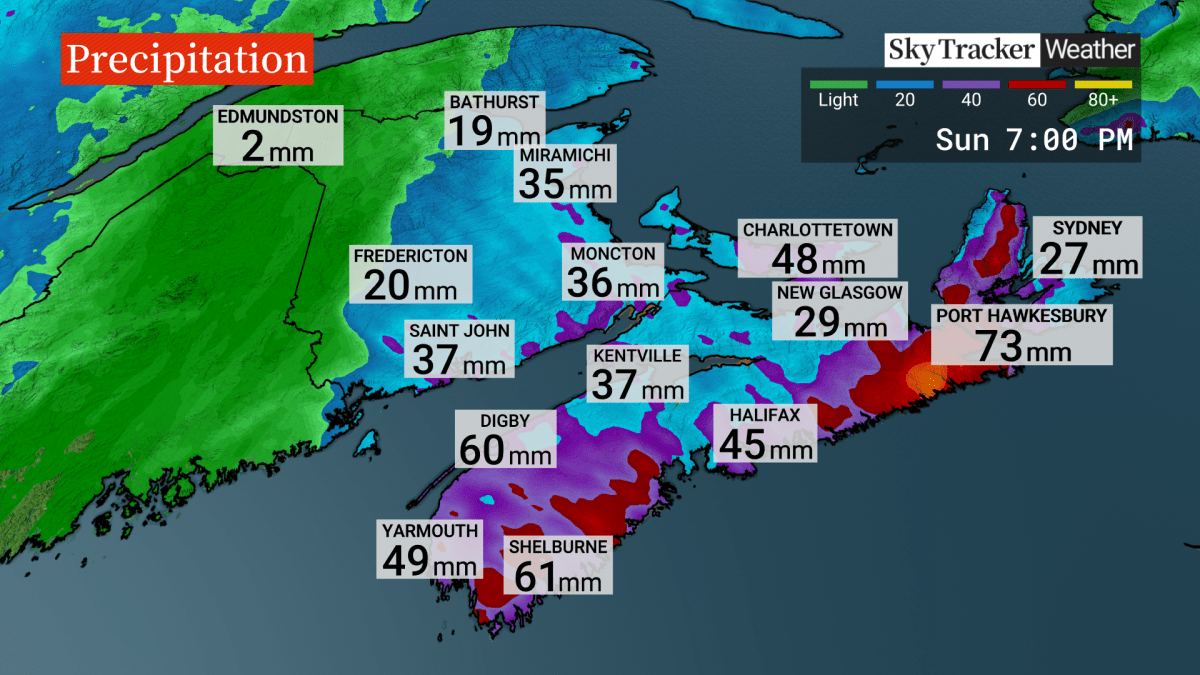Parts of Nova Scotia may see up to 25 millimetres of rain per hour starting Friday evening, Environment Canada is warning.

The federal weather agency issued a rainfall warning for western Nova Scotia, including Halifax, advising of anywhere between 40 and 60 mm of rain in those areas; at times, Environment Canada is forecasting 100 mm in areas where rain is expected to be heaviest.
The agency added the storm will continue until Saturday afternoon.
“An area of low pressure containing tropical moisture will bring significant rainfall to the province. The majority of the rain is expected to fall over a 12-hour period with rainfall rates up to 25 mm per hour possible over some locations,” Environment Canada said.
“In addition to the rain, wind gusts of up to 70 to 80 km/h are expected on Saturday.”
Environment Canada added that similar storms in the past have caused road shoulder erosion and washouts, basement flooding and scattered utility outages.

Get breaking National news
However, Global News meteorologist Anthony Farnell said he isn’t expecting any major disruptions from the storm.
“The impact on infrastructure will be minimal. Large waves are likely just offshore and some minor coastal erosion or flooding is possible,” he said.
“This system is a good reminder that hurricane season is far from over. Forecasters are still calling for a very active second half of the season which means Maritimers need to keep their guard up.”
Province hit hard by flooding
Nova Scotia has been under pressure to establish a robust alert system after several flooding-related deaths in as many years.
In July last year, four people died — including two young children — in floods in the municipality of West Hants after 250 mm of rain fell over 24 hours.
On July 11, a young person died in Wolfville, some 95 kilometres northeast of Halifax, after they were swept into a ditch overflowing with rushing floodwaters from remnants of hurricane Beryl.
Recordings of radio calls made July 11 by the fire department in Kings County, which includes Wolfville, indicate residents were already calling in about extreme flooding around 5:30 p.m.
The calls were first reported by the Globe and Mail and described submerged, impassable roads and people having to flee their homes.
If Nova Scotia had a well-developed flooding alert system, emergency notices likely would have been sent to people’s phones before a tragedy had already happened, said Jim Abraham, a retired Environment Canada meteorologist.
“If the province, who’s responsible for flood warnings or alerting, doesn’t have the infrastructure to detect and predict — if there isn’t even such an official thing as a flood warning program — then, of course, it’s going to take longer,” Abraham told The Canadian Press on July 12.
“As much as I can tell, by the time … the impact of the event is recognized, it’s already almost too late to get the alert out. And in this case the event had mostly passed by the time the alert went out.”
— with files from The Canadian Press









Comments